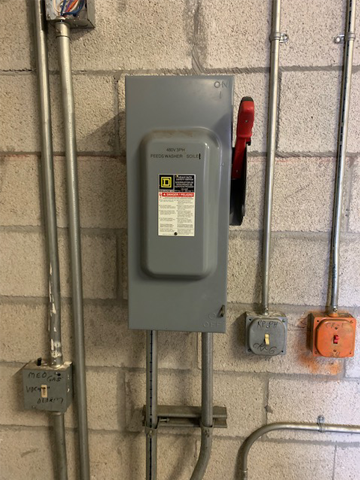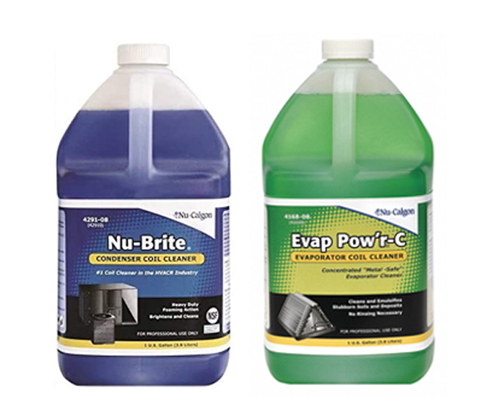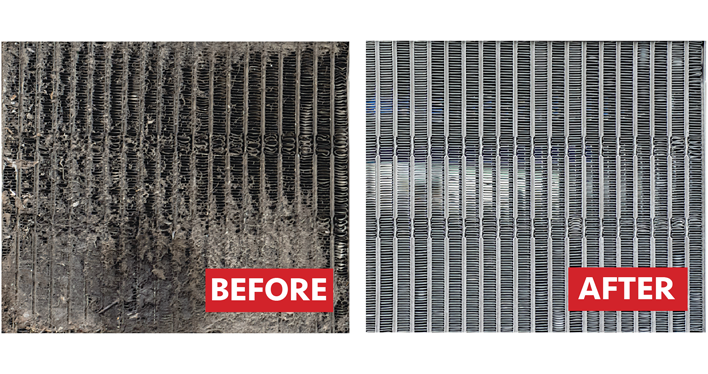Keeping your HVAC coils clean will help maximum the performance of your unit and prolong the life of the coils.
With dirty coils increasing energy usage upwards of 30%, we recommend initiating a coil-cleaning plan upon installation of new equipment.
Much like that visit to your hygienist, you may not look forward to a cleaning but it’s necessary. And with guidance from our experts, this shouldn’t be nearly as painful…
HOW DO I KNOW IF MY COILS ARE DIRTY?
Although a scheduled maintenance plan is the best way to stay on top of keeping coils clean, there are a couple of ways to check if they are in need of maintenance.
• Checking design air pressure drop across the coil vs. the design specifications. With a dirty condenser coil you will have high refrigerant head pressure. With a dirty DX coil you can see a low suction pressure along with poor airflow. In both instances, a higher air pressure drop then design air pressure drop indicates a dirty coil that should be cleaned.
• You can also visually inspect the coil. If it looks dirty, clean it! (How’s that for expert guidance?)
HOW OFTEN SHOULD COILS BE CLEANED?
Under normal environmental conditions, a DX evaporator coil or condenser coil should be cleaned once a year.
During periods of high cooling demand or when dirty conditions prevail (think cottonwood fuzz buildup), the coil should be cleaned more often. Additionally, a coil with a high fin density is notorious for trapping dirt and should be cleaned more frequently.
A condenser coil running under extreme conditions: clean quarterly
Units residing within one mile of salt water: clean monthly
A DX evaporator coil taking in outside air near any corrosive environment: clean quarterly
HOW TO CLEAN A COIL:
Prior to cleaning the coil, it’s important to disconnect and lockout the electrical power to prevent any chance of the unit being turned on.

Take steps to avoid saturating any motors or electrical components. This will prevent possible motor or electrical failure due to over saturation. Remove large debris from the coils and straighten fins before cleaning.
Clean coils with a pressure washer with a nozzle ranging from 25 to 40 degrees, making sure it does not bend the aluminum fins. Use a non-acidic and alkaline-based cleaner, such as Nu-Brite for condenser coils and Evap Pow’r-C for evaporator coils. The foaming property of these cleaners helps bring debris out of the interior of the coils.

If an acidic coil cleaner must be used, be sure to follow instructions EXACTLY, making sure all residue is rinsed from the coil upon completion. There is inherent danger to ruining the coil using such a cleaner.
Should the coil need a gentle scrubbing, only use a soft bristle brush. Rinse coils thoroughly after cleaning using a power washer or hose.
Failure to follow these guidelines or the manufacturer's instructions for use of cleaning chemicals could result in damage to the unit. Exercise extreme caution with any caustic or toxic chemical coil cleaning compounds to prevent personal injury or equipment damage.
USE STEAM TO REDUCE MESS
For a coil that is in an interior location of a home or building, employing a steam system is a highly effective way of cleaning while reducing the mess that water can make. You don’t need the above cleaners but do be conscious not to over saturate the motor or electrical components.
Remember to apply the steam at a low pressure and keep the stream parallel to the fins to prevent folding them over.
A LITTLE MAINTENANCE GOES A LONG WAY
When properly maintained, commercial HVAC coils can have a long lifespan. Typically, condenser coils last 10 to 15 years, DX evaporator coils last 15 to 20 years and water coils last over 20 years. What’s more, a quality replacement coil can last just as long as an OEM coil, possibly even longer — by increasing the thickness of the materials of construction.
Remember, though, for any type of commercial coil, the physical location along with environmental conditions, either natural or man-made, can have a significant decrease in the lifespan of the coil.
WHAT IF MY COIL IS COATED?
Coated coils provide resistance to corrosion from various contaminants. Coating is not any less likely to become dirty or get clogged, so it is critical to maintain the coil the same as if it were uncoated. In doing so, you will make sure the coating is in optimal condition to effectively prevent against corrosion for years to come.
When properly maintained, commercial HVAC coils can have a long lifespan.

Have a question or need a coil quote? Email us anytime.


Comments
Post a Comment